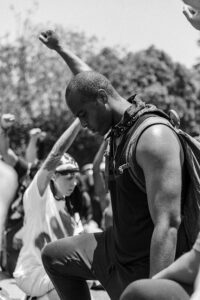 In the first installment in our series, “Insert Title Here,” Equal Measure’s James Liou shares his conversation with Eric Medina (left), program officer at the Los Angeles-based Weingart Foundation. Eric is also a co-chair, along with James, of Asian Americans and Pacific Islanders in Philanthropy.
In the first installment in our series, “Insert Title Here,” Equal Measure’s James Liou shares his conversation with Eric Medina (left), program officer at the Los Angeles-based Weingart Foundation. Eric is also a co-chair, along with James, of Asian Americans and Pacific Islanders in Philanthropy.
The themes of context and time were striking in our dialogue—and provide a compelling response to one of the primary questions of our new conversation series: What is the role and responsibility of foundations to promote positive social change—and racial equity, specifically? What are philanthropic leaders thinking about and doing in this moment?
James: Can you share an overview of your work at the Weingart Foundation, and its overall mission? What does it fund? How did this mission develop, and what drew you to it?
Eric: The mission of the Weingart Foundation is to partner with communities across Southern California to advance racial, social, and economic justice for all. The Foundation achieves this by making multi-year, unrestricted operating support grants to organizations across Southern California that are working towards achieving racial equity and justice. The Foundation also has a special interest in supporting organizations in South and Southeast Los Angeles.
Our work is constantly evolving, but we arrived at making unrestricted operating support grants back in the Great Recession of the late 2000s. At that time, we heard loud and clear from our nonprofit partners that they needed unrestricted funding to keep the doors open, pay the bills, and make sure they make payroll. The Foundation continues to make unrestricted operating support grants, because we hear from nonprofits all the time that they like the flexibility of that type of funding. For our part, we created a learning and assessment framework where we try to understand if unrestricted funding provides the flexibility to help build organizational effectiveness.
James: It’s really compelling that you talk about your current unrestricted funding approach as the result of listening, acting upon what you heard, and an intentional evolution. How about the Weingart Foundation’s focus on equity? How does that fit into the picture?
Eric: The commitment to equity has always been a part of our grantmaking, but it was solidified a few years ago. Knowing how systemic racism has impacted the communities where we work, we are committed to supporting systems change. To that end, we have recently developed the John Mack Movement Building Fellows Program and a Youth Organizing funder collaborative. Equity cuts across all aspects of the Foundation and not just through our grantmaking. We are reallocating our investments to ensure it is mission related, using our resources to provide program-related investments, and we look at decisions to hire vendors and staff through a racial equity lens.
James: I’m struck by the idea of momentum, of time and the idea that the Weingart Foundation has been willing to grow and change its approach. The words that you used—evolution and solidification—are powerful, especially as many philanthropic institutions struggle to embrace risk-taking and change.
Let’s pause a bit to explore the notion of time and our current social, political, and racial context. In Philadelphia, there’s been the proliferation of rapid response funds to address immediate needs—but on the other hand, the pace of change among many traditional funders to re-examine and change long-standing grantmaking approaches has been slow. It makes me think about the distinction—and accompanying reaction—from those funders who see this as a temporal moment, and those who see it in the context of a larger movement.
In what ways has your mission changed in this moment in time, from the global context of the COVID-19 pandemic, intensification of demands for racial justice and Black Lives Matter, and what you’ve been hearing from your grantees and community leaders?
Eric: In March 2020, when the first stay-at-home orders were made and unemployment was skyrocketing, the Foundation responded with $2 million in emergency grants to different community foundations and community based organizations across Southern California that were working on emergency response. We continued with our unrestricted operating support grants, but decided to go to invitation only for FY 2021 to manage demand and limited resources.
Fred Ali, our president and CEO, also participated in the Committee for a Greater LA to understand the effects that COVID had on different populations throughout Los Angeles County. Nonprofit, business, philanthropy, labor, government, and other community leaders held weekly data briefings on topics such as employment, housing and homelessness, youth, and trauma, with COVID-19 as a through line.
Following the murder of George Floyd, the committee expanded its focus to a comprehensive view of systemic racism—especially anti-Black racism. The initial product of that committee was the publication of the No Going Back report that includes 10 guiding principles addressing areas from housing, economic justice, and mental and physical health to youth voice, immigration, and the role of the nonprofit sector. Miguel Santana, the Chair of the Committee for a Great LA, is the incoming president and CEO of the Weingart Foundation, and we are exploring how the report can help inform our grantmaking in the future.
James: Is there a specific moment of reflection or conversation with a community leader that encapsulates the complexity and opportunity of this moment for philanthropy and systems change leaders? Can you share that story with us?
Eric: The mentally hard part of this job in the time of COVID is to hear the harrowing stories from nonprofit leaders about the plight of their clients and members, the staff of these nonprofits, and the leaders themselves. One leader who I have known for almost 20 years as a nonprofit colleague confided to me about the stress and hardship of raising two kids, trying to get them to school virtually, getting on weekly Saturday morning Zoom meetings with partner organizations to coordinate the distribution of food, computing technology, other essential items, and working during the week to organize campaigns as part of the social justice movement response to the murder of George Floyd. She shared how she was inspired and a little scared about joining her youth organizers to show up at a school board meeting where they were discussing the possible reallocation of school police resources to support other student services.
It’s dozens of these types of conversations with leaders where I just listen because they need someone to confide in; that makes me grateful for the work that I do. It’s through those conversations that, despite the negative rhetoric you hear and read about racists in our country, or people putting their individual needs ahead of the needs of our communities, you know there are heroes in our communities fighting for justice.
James: I can’t recall who said it, but there’s the provocative—and I think true—notion that philanthropy can’t “nonprofit its way to racial equity.” For me, that means that a few thematic or more “race-conscious” grants aren’t enough—nor is the idea that nonprofits can be burdened with addressing and deconstructing deep-seated racial inequities and lack of essential resources on their own. It requires so much more. From your perspective, what is the role of philanthropy at this time related to racial equity, justice, and liberation? What are the primary opportunities, limitations, and lessons you’ve learned?
Eric: When some people think about philanthropy, they solely focus on the grant and the transaction, and what a nonprofit can do with those critical resources. However, the grant these days is not enough. Philanthropy should be a part of the truth and reconciliation racial healing process, which will take longer than the time I will be on this earth. The first step is listening. We need to listen to the stories of our Black and Indigenous brothers and sisters, and use our position in philanthropy to act on those stories. We need to support systems change through organizing, advocacy, and power building in these communities. And, generationally, we need to invest in the leadership of our youth who are already building movements for change.
James: What is one primary action that you think all philanthropic institutions and leaders should take in this moment, regardless of what issue area or sector they fund?
Eric: Like our nonprofit partners, philanthropic institutions sit at different places in their journey, and regardless of size and reach, there is a need to build capacity. This can be done at the board, management, or staff level. Some philanthropies may look at unrestricted operating support grants. Others may develop a racial equity and justice framework. Whatever it is, we need to keep getting better, but this goes back to what I mentioned earlier. Philanthropy needs to listen first, then act accordingly to build that capacity.
James: Listen first, and act accordingly. Sounds like advice that we can apply to a lot of parts of our personal lives, and perhaps in our national, civic dialogue! Two final things: Given that the name of this conversation series is “Insert Title Here,” what title would you give to the work you’re leading now, particularly in response to the question I posed up top from this conversation series? And what’s the best way for us to follow your work and the larger work of the Weingart Foundation?
Eric: Here’s the title that comes to mind for me: “Equity and Justice Require Unrestricted Operating Support.” You can sign up for the Weingart Foundation e-newsletter at www.weingartfnd.org. I would also recommend that folks read the Committee for a Greater LA No Going Back Report.
James: Thank you, Eric, for the conversation today and for the work you’re leading in Greater Los Angeles. We look forward to learning from the resources you shared, and continuing to support philanthropic leaders who are working hard to continue evolving within and through their own institutions. I owe you a trip to one of our excellent hand-pulled noodle shops in Philadelphia when we can start traveling again! Friends and colleagues, what questions or possibilities does this conversation raise for you?
In March, 2021 I’ll swing back east to Philadelphia, where I’ll talk with Kristi Poling, program director at The Barra Foundation. See you then!
Eric Medina is a program officer at the Weingart Foundation in Los Angeles, CA.
James Liou is a senior director at Equal Measure in Philadelphia, PA.

Photo credit: Nathan Dumlao on Unsplash